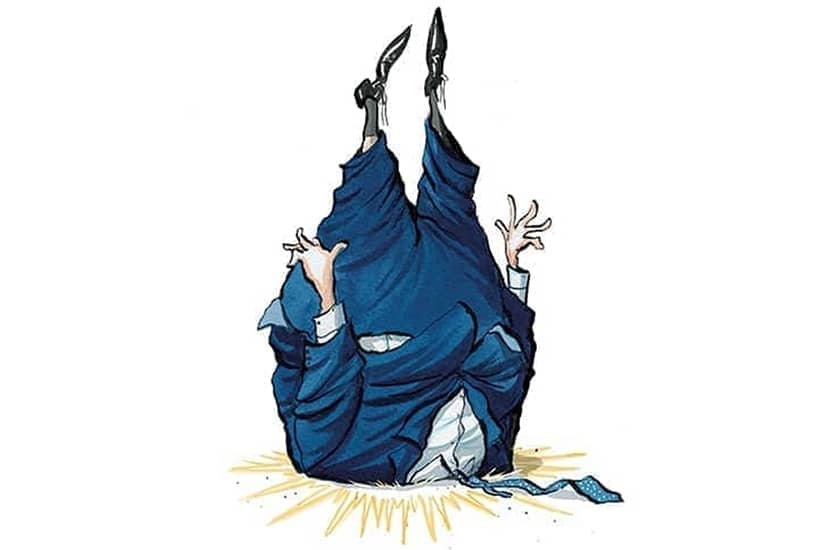When Omicron struck, Britain was already the most boosted country in Europe. Our programme was so advanced that 80 per cent of pensioners were already triple-jabbed. This helped force the new variant into reverse in the first days of January, with hospitalisations half of the previous peak. A country whose economic recovery had already surpassed almost all expectations can now continue to grow — in contrast to many European countries still dragged down by restrictions and heavy-handed mandates.
In such circumstances, the Prime Minister might reasonably expect to be fêted. Instead Boris Johnson is fighting for his political life, unsure of when his mutinous Tory MPs might come for him. Sue Gray’s report is not the end of it: Johnson will now spend weeks under a police investigation into whether he and his Downing Street staff broke the lockdown rules they forced upon the rest of the country.
Each day brings fresh revelations. Headlines about birthday cakes may sound absurd, but it was the PM’s decision to outlaw such parties, indeed almost all forms of socialising. He sent the police after the public for having far smaller gatherings. He cannot complain now that he is held to account in the same way as thousands of others dragged through the courts for similar behaviour.
The Prime Minister can say that the tax hike is no longer needed – thanks to the dividends of stronger growth
It’s not a question of how many such embarrassments the PM can endure. The cash-for-honours scandal let Tony Blair demonstrate just how long a prime minister can go on under criminal investigation. Johnson will stay until enough Tory MPs calculate that a putsch — exposing the party at its feuding, self-obsessed worst — would be better than letting him stay in power. It’s quite possible that the new intake of MPs, less versed in regicide than the others, will lead a botched attempt that leaves Johnson weakened but still in place.
To an extent, that has already happened. He has lost the confidence of Tories in the Scottish parliament, almost all of whom have come out against him. Only seven Westminster MPs have so far done the same, although dozens more are ready to join in when the time is right. It would take 180 rebels to win a vote of no confidence.
As other MPs weigh up the pros and cons of turning on their leader, Johnson has one last chance. He can argue that the fact the country has just been protected from Omicron and the burden of a new lockdown is more important than cheese, wine and birthday cakes. He can compare Britain to almost any other country in Europe to underline his point. The Pass Sanitaire has not saved France from a far worse Omicron outbreak than Britain’s. Emmanuel Macron’s vaccine passport scheme inflicted a massive loss of civil rights yet has given French people little discernible protection from the virus. The Dutch are now emerging from a draconian lockdown, the threat of which still hangs over Germany. Olaf Scholz, its new Chancellor, has said he favours the type of compulsory vaccination already in force in Austria. After a wobble, Johnson has emerged having protected both civil liberties and the health service. It ought not to be difficult for him to make that argument — and then to point to the opportunity that now stems from this success.
The recovery is well under way. Unemployment peaked at just 5.2 per cent, less than half of what had been feared when Covid first struck. This has created a palpable cash dividend. Monthly finances show tax revenue is so far £18 billion more than the Office for Budget Responsibility worried it would be last October. This is the result of a resilient economy, buoyant corporation tax receipts and the success of a furlough scheme that was designed to minimise the scarring effect of lockdown and ensure such a recovery was possible.
This £18 billion might now be used to cancel (or at least delay) the National Insurance rise that Johnson plans in April. Yes, there will also be extra costs (inflation will push up debt interest) but unless they cancel out the extra tax haul there may be quite a lot of headroom. Rather than use it for another spending splurge, the Prime Minister could say that the tax hike is no longer needed — thanks to the dividends of stronger growth. This would honour the 2019 manifesto pledge not to raise National Insurance.
It would also help people cope with the cost-of-living crisis. Families are already facing soaring prices: inflation is up to 5.4 per cent and rising. Wages are not keeping pace. Big-government conservatism is pushing the tax burden to its highest in 71 years. The last thing families want now is hundreds more pounds taken out of their payslips for a care-home reform programme that doesn’t even guarantee a single extra bed will be added to the current total.
To survive, Johnson will have to persuade his party that he has changed — not just the No. 10 team but his political direction. Cancelling the National Insurance rise would be a sign that he can recognise the opportunity in front of him, resist the urge to spend more and return his government to the lower-tax Conservative agenda on which it stood for election.






Comments